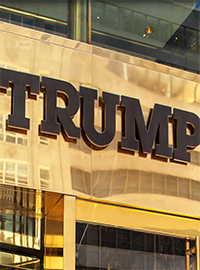| Is the Trump Tower Meeting Really Proof of Collusion? |
 |
|
By Byron York
Wednesday, May 23 2018 |
If there is an Exhibit A in the case that the Trump campaign colluded with Russia to fix the presidential election, it is the June 9, 2016, meeting in Trump Tower between three top campaign officials — Donald Trump Jr., Paul Manafort and Jared Kushner — and a group of Russians who promised dirt on Hillary Clinton. And if there is a key document about the meeting — an Exhibit A of Exhibit A — it is the email from British music promoter Rob Goldstone to Trump Jr. proposing the get-together. Read in light of the accusations leveled against President Trump and his campaign after the election, the email almost screams: WE WANT TO COLLUDE WITH YOU. But did it really? Newly released testimony from several participants in the Trump Tower meeting suggests the answer could well be no. In the email, Goldstone told Trump Jr. that a powerful Russian had "offered to provide the Trump campaign with some official documents and information that would incriminate Hillary and her dealings with Russia and would be very useful to your father." "This is obviously very high level and sensitive information," Goldstone continued, "but is part of Russia and its government's support for Mr. Trump." Russia and its government's support for Mr. Trump — to some analysts, those were the key words of collusion, along with Trump Jr.'s response: "Seems we have some time and if it's what you say I love it." But what, precisely, did the Goldstone email mean? What were the intentions behind it? Did it reveal a Russian campaign to assist Trump? Was it a key part of a collusion scheme to fix the 2016 election? The just-released testimony, which includes transcripts of two interviews with Goldstone, is from the Senate Judiciary Committee's Trump-Russia investigation. It suggests that the language of the email — the words that electrified the political world when they were reported last year — were less an invitation to collusion than what Goldstone called "publicist puff," that is, inflated phrases used to entice the candidate's top aides to accept a meeting. And then, when Trump Jr. agreed to the meeting, the Russians, far from offering the promised dirt on Clinton, made a conventional, lobby-like pitch — not a surprise, given that the American law and lobbying firm Baker Hostetler was behind much of it — to win Trump support for getting rid of U.S. sanctions against Russia in the Magnitsky Act. There's no evidence that anyone proposed a deal; instead, the Russians got in the door, made their pitch and left when the Trump team wasn't interested. Goldstone's email pitch made the meeting sound like something much bigger. But reality did not back it up. Goldstone told the committee that on the morning of the day he sent the email, he received a call from his employer, a man named Emin Agalarov, who "said that a well-connected Russian attorney had met with his father that morning in his father's office and had told him that they had some interesting information that could potentially be damaging regarding funding by Russians to the Democrats and to its candidate, Hillary Clinton." (Emin Agalarov is a Russian singing star who is the son of Aras Agalarov, a billionaire who was Donald Trump's partner in the 2013 Miss Universe pageant in Moscow.) Investigators asked Goldstone why he told Trump Jr. that the Russian government supported Trump. Goldstone explained that he had been to Russia several times, including during the 2013 pageant, and "I had seen and heard firsthand people of all levels, whether it was business people, whether it was friends of Emin, friends of his father, talk in very glowing terms about Mr. Trump. I had also seen on television in Russia many, many reports in which government officials, including the president, Mr. Putin, had praised Mr. Trump, who, in turn, I had seen on CNN had praised Mr. Putin." So, he basically just made up the stuff about Russia's support of Trump. Goldstone was asked whether at the time he was aware of any Russian efforts to interfere in the U.S. presidential election. He said he was not. He was asked if he knew anything about the supposed documents that were being offered to Trump Jr. He said he did not. So why did Goldstone choose the words he chose in the email? An answer came in a 2017 email provided to the committee. Shortly after the Trump Tower meeting was first reported in the media, Goldstone and Emin Agalarov exchanged emails on how best to address the story. Goldstone sent Agalarov a draft statement saying that in the email he used "the strongest hyperbolic language" to convince Trump Jr. to take the meeting. Asked by the Senate what he meant by "strongest hyperbolic language," Goldstone said, "That I had puffed it and used some keywords that I thought would attract Don Jr.'s attention." "I mean, publicist puff is how they get meetings," Goldstone added. Others in the room, including a translator thought to have an unbiased view of events, did not remember discussing the promised "dirt" on Clinton, nor anything involving Trump-Russia collusion. The meeting came to nothing. Natalia Veselnitskaya, the Russian lawyer crusading against the Magnitsky Act, left disappointed, while the three Trump officials were apparently unhappy that 20 minutes of their time had been wasted. A year later, when news of the meeting broke, it became the most important 20 minutes of the Trump-Russia investigation. And that is it. In the end, unless some startling new evidence appears, the notorious Trump Tower meeting seems more like a clumsy attempt at lobbying than a conspiracy to interfere with a presidential election. Byron York is chief political correspondent for The Washington Examiner. |
Related Articles : |
























